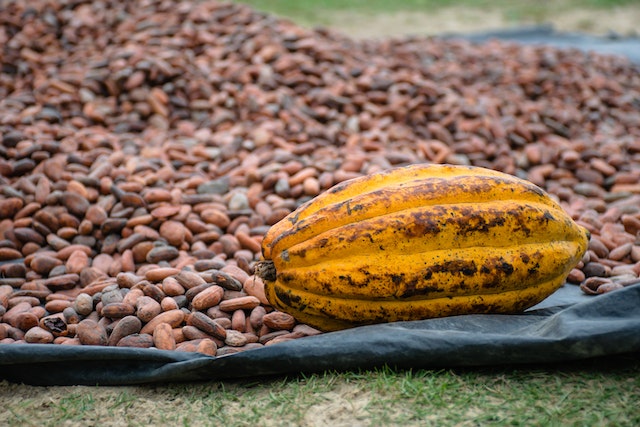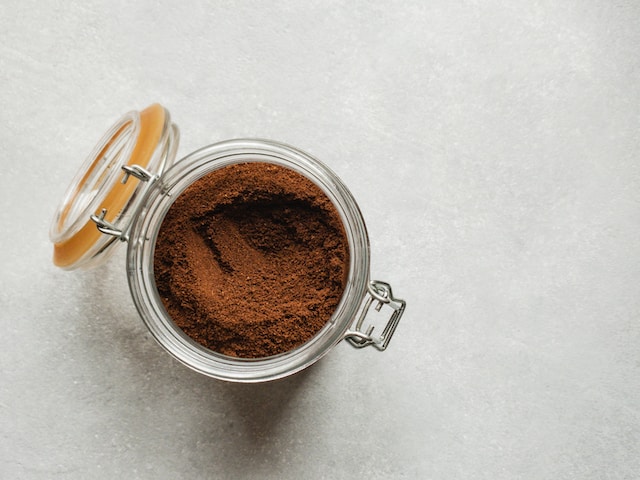
Caffeine in Hot Chocolate vs. Coffee and Tea: Which is Better for You?
February 15, 2023
Sustainable Cocoa: Why Lab-Grown Chocolate is Not the Solution
March 10, 2023Brewed Cacao vs. Coffee:
8 Reasons to Drink Cacao Instead of Coffee
Wondering whether cacao can replace your coffee? You’re not alone.
While coffee consumption remains popular, more people are also seeking cacao alternatives to their cup of morning joe. And that for good reasons.
There’s evidence that brewed cacao can be a better substitute for coffee in some situations, all thanks to differences in caffeine content, nutrient value, and mineral composition.
This article gives you 8 reasons to swap your coffee for a healthier cup of cacao. You’ll also learn about conditions where neither cacao nor coffee would do.
Read on.
Brewed Cacao vs. Coffee: 8 Reasons to Replace Coffee with Cacao
Although there are similarities between cacao and coffee, their differences give cacao an upper hand in many cases. Except, of course, for those who only drink their joe for its flavour. For more health-conscious drinkers, cacao as a coffee alternative is a perfect substitute because it provides an energy push plus added benefits.
1. Cacao is a Non-Jittery Energy Booster
You could say that cacao is almost caffeine-free. It contains just 0.2% caffeine per bean weight as compared to coffee’s 1.01% -2.4% caffeine per bean weight depending on the variety. Remember that the coffee bean is way smaller than the cacao bean, which just means even more caffeine in the same amount of powder as cacao.
You know what cacao has in larger amounts instead? Theobromine.
Theobromine dilates the blood vessels, unlike caffeine that constricts them. As a result, theobromine increases blood flow and energy while calming you down. So you get an energy boost without the nervousness or jitters that coffee brings.
Because theobromine has a longer half-life (7.2 hours), its effects last longer. Which brings us to the next point.
2. With Cacao, No Mid-afternoon Crashes
Coffee provides a more potent energy shot which wears off faster, leaving your body fatigued and in need of afternoon pick-me-ups.
Not so with cacao. With its longer lasting effects, drinking cacao instead of coffee in the morning doesn’t leave you with slumping by midday.
3. Cacao Enhances Your Mood
Cacao has a handful of compounds with diverse effects on the body. Those responsible for that happy feeling you get after a cup of cacao include theobromine, serotonin, tryptophan, phenylethylamine, and the micronutrient magnesium. These natural substances improve mood, increase focus, and may help with depression and premenstrual syndrome.
READ ALSO: Cacao Powder Benefits
4. Healthy Skin
Replacing your coffee with cacao can improve your skin.
A randomized controlled study involving two groups of women found that cacao flavanol offered protection from sunlight, improved blood circulation and hydration, leading to a thicker, healthier skin.
Coffee, on the other hand, may negatively affect the skin because of the stress from too much caffeine. The stress response releases cortisol, which increases the amount of oil on the skin, while the caffeine disruption of sleep results in more stress on the body.
5. Improve Sleep Quality
You should already know that you can’t take coffee towards evening unless you’re planning to stay awake and alert at night.
On the contrary, the magnesium in cacao calms you while tryptophan and serotonin promote better sleep, besides enhancing your mood.
So yes, you can enjoy a cup of cacao at night and still sleep well. For better results, drink it without added sugar, as high sugar before bedtime can lead to insomnia.
6. No Withdrawal Headaches
The potential for caffeine dependence is high with regular consumption of coffee. The emphasis is on regular, not just the amount of caffeine.
According to John Hopkins Medicine, a small cup of coffee per day, that’s about 100mg of caffeine, can still lead to dependency. Imagine the potential java dependency for the average drinker with at least 3 cups per day.
If, for whatever reason, a regular drinker can’t continue taking their coffee, the body suffers withdrawal symptoms. Headaches, fatigue, drowsiness, irritability, depression, difficulty concentrating, nausea and vomiting, and muscle pain are among the common symptoms identified by John Hopkins Medicine.
With far less than 100mg of caffeine in a cup of cacao, you need not fear any withdrawal symptoms should you decide to stop.
In addition, cacao can be an alternative to taper off your body’s caffeine dependence from coffee without suffering from withdrawal symptoms for total lack of caffeine.
7. More Nutrients and Vitamins
Compared to coffee and tea, cacao is home to more nutrients, more vitamins, and more flavonoids. Minerals like magnesium, calcium, copper, potassium help regulate various processes in the body, like blood sugar control, nerve and muscle function, and protein synthesis.
See this other article for a better comparison of the nutrient value between cacao, coffee, and tea.
Just considering on a health wise scale, replacing coffee with cacao is a healthy decision.
8. More Flavonoids, More Health Benefits
Cacao is rich in the polyphenols known as flavanols. Flavanols are a group of natural antioxidants linked to many health benefits as they reduce the risk of chronic diseases.
They improve immune function, brain function, and good cholesterol profile. They also lower blood pressure and blood sugar levels, and reduce inflammation.
They protect cells by fighting free radicals, and so are beneficial in the prevention of various cardiovascular and central nervous system diseases like stroke, diabetes, heart disease, Alzheimer’s, and cancer.

Photo by Anastasia Eremina on Unsplash
When Cacao is Not the Right Substitute for Coffee
Not everyone can swap their coffee for cacao. Although the amount of caffeine in cacao is minimal compared to coffee, the effect on people with caffeine intolerance can be profound.
Symptoms of caffeine sensitivity include a racing heartbeat, headache, restlessness, jitters, and insomnia. These symptoms are the same as in caffeine overdose, usually over 400mg per day or over 200mg in one shot.
The difference here is that in people with caffeine sensitivity, their liver cannot metabolize the substance. So even small amounts provoke symptoms similar to caffeine overdose.
There’s no diagnostic test for caffeine sensitivity. If you think you’re highly sensitive to small doses of caffeine, consider swapping your coffee with a caffeine-free beverage.
How to Shop for Healthy Cacao Powder
Not all cacao powders are the same. To compound matters, there’s also cocoa powder, which is similar to cacao powder but not interchangeable in terms of nutrient value.
As a general rule:
1. Shop for natural cacao powders
Look for pure, unsweetened cacao powder. The less processed the powder, the better for superior taste and more antioxidants. Cocoa powder treated with alkali has about 60% less flavanol content. So be sure to read labels.
2. Shop for fair-trade cacao
Fairtrade cacao manufacturers follow farming or sourcing processes that ensure sustainable incomes for farmers and eco-friendly farming. Buy from people who sell with their consciences intact.
Cacao vs. Coffee: The Takeaway
Cacao as a substitute for coffee is a drink with plenty of health benefits. It contains less caffeine, more nutrients, more vitamins, and especially more flavanols. It has no withdrawal symptoms, does not leave you fatigued and craving for pick-me-ups in the afternoon, and does not disrupt your sleep. Taken consistently, it can leave your skin healthier through its photoprotective and hydrating properties.
For better results when replacing your coffee with cacao, go for natural unsweetened cacao powder and use with low sugar.
References
https://www.sciencedaily.com/releases/2015/09/150910110832.htm
https://www.sciencedirect.com/topics/biochemistry-genetics-and-molecular-biology/theobromine
https://www.webmd.com/diet/health-benefits-cacao-nibs
https://www.hopkinsmedicine.org/Press_releases/2004/09_29_04.html
https://goodking.co/pages/cacao-vs-coffee
https://www.healthline.com/health/food-nutrition/quitting-caffeine-benefits
.
Chocolate Extinction: Fact vs. Fiction + What Chocolate Lovers Can Do
Chocolate ExtinctionFact vs. Fiction, What Consumers Can Do Share On Facebook Twitter Email Is the world really running out of chocolate? Not really. Currently the global […]
Corporate Chocolate Gifting Ideas to Appreciate Employees and Delight Clients
Corporate Chocolate GiftingHow to Appreciate Employees & Delight Clients Share On Facebook Twitter Email When it comes to corporate gifting, a one-gift-fits-all approach just doesn't cut […]
Cacao Supper Club at Home: Guide to Tasting Chocolate, Cacao Tea, and Pulp Juice
Cacao Supper Club at HomeGuide to Tasting Chocolate, Cacao Tea, and Pulp Juice Share On Facebook Twitter Email Imagine gathering around the table with a few […]





